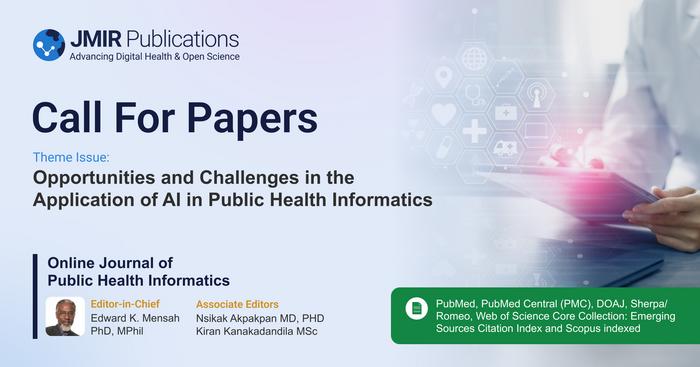The transformative potential of artificial intelligence (AI) within the realm of public health informatics stands at a pivotal crossroads, offering both unprecedented opportunities and daunting challenges. As the global community increasingly relies on digital technologies to monitor, predict, and manage population health, the integration of AI methodologies promises to revolutionize the ways in which health data is gathered, analyzed, and ultimately leveraged to combat disease. Amidst this landscape, JMIR Publications has announced a call for submissions to a dedicated theme issue titled “Opportunities and Challenges in the Applications of AI in Public Health Informatics,” reflecting the urgency and significance of this emerging field.
Public health informatics, a specialized domain concerned with the application of informatics principles to public health practice, surveillance, and research, is uniquely positioned to benefit from recent advances in AI. Machine learning algorithms, natural language processing, and predictive analytics can transform vast and complex datasets into actionable insights, expediting epidemic detection, resource allocation, and intervention strategies. However, the deployment of AI in this setting must navigate intricate technical, ethical, and socio-political waters to ensure outcomes that are both effective and equitable.
At the core of AI’s promise lies its ability to enhance disease surveillance systems. Traditional epidemiological methods, often reliant on retrospective data analysis, have limitations in speed and granularity. AI-powered tools enable the real-time synthesis of heterogeneous data sources, including electronic health records, social media feeds, environmental sensors, and genomic sequences. Such integration allows for the early detection of outbreaks, identification of emerging health threats, and dynamic adjustment of public health responses with unprecedented precision and timeliness.
Yet, the journey from raw data to informed action hinges upon addressing critical concerns around data quality, interoperability, and standards. The adherence to FAIR principles—data that is Findable, Accessible, Interoperable, and Reusable—is essential to transform disparate health information into AI-ready formats. This requires robust data curation strategies, standardized metadata frameworks, and harmonized ontologies to facilitate seamless data sharing across institutions and borders. Without systematic attention to these foundational elements, AI applications risk being undermined by fragmented datasets and inconsistent outputs.
Beyond technical challenges, the ethical dimensions of AI in public health are profound. Algorithmic bias presents a formidable obstacle, particularly when training data does not sufficiently represent diverse populations. AI systems trained on skewed datasets may produce inequitable health recommendations, perpetuating disparities and undermining trust. Ensuring transparency and explainability in AI decision-making processes becomes a prerequisite to uphold accountability and engender stakeholder confidence. Multi-disciplinary collaboration among data scientists, ethicists, public health professionals, and affected communities is imperative to navigate these complexities.
Privacy and security considerations further complicate AI’s integration into public health informatics. The sensitive nature of health data demands rigorous safeguards to protect individual confidentiality and comply with evolving regulatory frameworks worldwide. Differential privacy techniques, federated learning models, and secure multiparty computation are emerging as promising technical solutions to balance data utility with privacy preservation. These innovations must, however, be aligned with ethical guidelines and legal mandates to maintain the integrity of public health initiatives.
As the field advances, the paradigm of precision public health exemplifies a transformative approach by tailoring interventions based on social determinants and localized risk profiles. AI facilitates this shift by enabling granular analytics that can identify vulnerable subpopulations and optimize resource deployment accordingly. This community-level targeting contrasts starkly with conventional broad-spectrum strategies, offering pathways to improve outcomes while reducing costs. Crucially, successful implementation demands robust human-AI collaboration, wherein health professionals contextualize algorithmic insights within lived realities.
The call for scholarly contributions to this theme issue embraces a wide range of topics pivotal to AI’s application in public health informatics. Among these are the development of methods to detect and mitigate bias in AI models, frameworks to ensure ethical decision-making in resource prioritization, and innovative practices for data preparation adhering to FAIR principles. Additionally, submissions exploring the deployment of AI in real-time disease outbreak prediction, digital contact tracing, and health policy formulation are expressly encouraged.
This initiative arrives at a moment when the world grapples with complex health challenges magnified by demographic shifts, climate change, and emerging pathogens. The accelerating pace of AI innovation offers a beacon of hope to augment public health infrastructure’s agility and responsiveness. Nonetheless, the field must remain vigilant to the pitfalls of technological determinism, ensuring that AI serves as an enabler rather than a replacement of human judgment and ethical stewardship.
JMIR Publications, recognized for its commitment to open science and digital health research, leads this effort to foster dialogue and innovation. By convening researchers, practitioners, and policymakers, the platform aims to catalyze the development of AI applications that are not only scientifically rigorous but socially responsible and scalable. The open access nature of the journal further democratizes knowledge dissemination, facilitating global collaboration in addressing public health informatics challenges.
In sum, the incorporation of artificial intelligence into public health informatics heralds a new epoch in health data science. Its success will depend on meticulous attention to data governance, ethical safeguards, stakeholder engagement, and technical innovation. This thematic call underscores the urgency of collective action to bridge gaps and harness AI’s full potential in shaping resilient, equitable, and data-driven public health systems for the future.
For more detailed information about the call for submissions and specific guidelines, interested contributors are encouraged to visit the online announcement hosted by JMIR Publications.
Subject of Research: Applications of Artificial Intelligence in Public Health Informatics
Article Title: Opportunities and Challenges in the Applications of AI in Public Health Informatics
News Publication Date: May 20, 2025
Web References:
- JMIR Publications: https://jmirpublications.com/
- Online Journal of Public Health Informatics Theme Issue Announcement: https://ojphi.jmir.org/announcements/569
Image Credits: Credit: JMIR Publications. Source: SOMKID THONGDEE
Keywords: Public health, Disease outbreaks, Epidemiology, Infectious diseases, Public policy, Generative AI, Machine learning, Artificial intelligence, Health care, Health equity, Medical ethics, Patient monitoring




